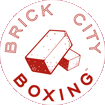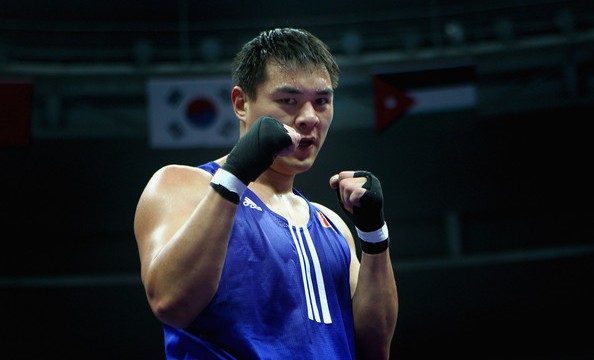ZHANG ZHILEI
When Dino Duva signed an agreement with the Chinese Boxing Federation to train its amateur fighters in 2010, the Associated Press wrote: “Zhang Zhilei is a 6-foot-6, 240-pound southpaw who could make a major splash in a heavyweight division that has grown stale while being dominated by Wladimir and Vitali Klitschko the past few years.”
Now, Zhang is ready to jump into the professional boxing waters, inking a promotional agreement with Duva’s Dynasty Boxing. The boxing Lane Brothers – Tommy and Terry, sons of the famous referee Mills Lane, are partners in the new venture.
The Chinese powerhouse nearly reached the zenith of amateur success in the summer of 2008, entering the Super Heavyweight Gold medal round at the Beijing Olympics against Italy’s Roberto Cammarelle. Having disposed of the Moroccan Mohamed Amaniss, Ruslan Myrsatayev from Kazakhstan and Vyacheslav Glazkov of Ukraine, all by large margins, he squared off against the Italian for a chance at glory. But it was not to be, as Zhang suffered his first defeat of that Olympiad, losing to Cammarelle, but proudly brought home the Silver Medal.
Zhang was a two-time gold medalist in his homeland as the big winner in the China National Games in both 2009 and 2013), those games are equal to the Olympics in China as an event of high prestige.
Born on May 2, 1983 in Henan, the Chinese giant had previously distinguished himself by capturing a Bronze medal in the Super Heavyweight Division at the world amateur championships 2007, setting the stage for his Olympic conquests a year later.
Zhang returned to the Olympics in 2012 in London, where he looked to repeat his 2008 performance. After a solid start, defeating the Australian Johan Linde, Zhang faced a stern test in hard-hitting Brit Anthony Joshua. Zhang lost a heart-breaker to Joshua, who would go on to sweep the tournament and win the Gold Medal.
Zhang began his career in 2003, participating in the World Championships. The inexperienced fighter took a loss in the first round, when he was defeated by fellow southpaw Grzegorz Kiełsa of Poland. But this did not deter Zhang, who went on to compete in the World University Boxing Championship the following year. There, he made it to the Finals, when he would eventually be defeated by the Uzbek, Rustam Saidov. Still, it was Zhang’s first podium finish in a competition.
This trip to the final helped fuel Zhang in the 2005 World Championship, hosted by his home country. He started off strong, defeating Vugar Alekperov in his first round. However, was unable to hold off the eventual winner, Odlanier Solis, in the following bout.
A breakthrough came in 2007 at the World University Boxing Championship. Zhang defeated the trio of Nurpais Torobekov, Rustam Rygebayev and Daniel Beahan en route to the Semi Finals. He lost to the Ukrainian, Vyacheslav Glazkov, but finished the competition in third place, qualifying for the 2008 Summer Olympics in Beijing.
Zhang went into the 2009 World Amateur Boxing Championships with high hopes after winning a silver medal in the Olympics the previous year. After three wins in the competition, he was finally stopped in the Semi Finals by Ukrainian,Roman Kapitanenko in a hotly-contested affair. Zhang would place third in the competition, standing proudly at the podium for a third consecutive year.
With a truckload of amateur background, Zhang Zhilei is ready to turn professional under Duva, and turn some heads in the process.
ZHANG ZHILEI QUOTABLES
1. How did you become interested in boxing, and at what age to you start?
“Boxing is a sport of speed, power, flexibility, stamina, courage, as well as perseverance. It is also a sport about being a man. I love boxing as much as my career goes on. I started to train as a fighter since 15.”
2. Did you have any great American heavyweights that you watched, idolized or that were your favorites?
“I started to look at some of the greatest fighters in the world after I got involved with boxing. Boxing events are only broadcasted on the weekends of CCTV5. But I never missed one show. I watched Ali, Foreman, Tyson, Holyfield, Louis, Tua and the Klitschko Brothers. They are great fighters and I do like the way they fight. I hope that I can win a golden belt someday too. “
3. Talk about the experience of winning the silver medal?
“Actually, I’m thankful that I can make the Olympics, because super heavyweight division has been dominated by fighters from Europe and America for a long time. After I qualified the Olympics in Chicago World Championships, I went back to China and started to prepare for the big game. I executed coach’s plan, studied every possible opponent, and trained accordingly. I didn’t think that much during Olympics. I did it step by step without paying attention to winning or losing. I just wanted to do it the way I trained. Everything went great until the finals. I was thirst for that gold medal so much that I started to get disturbed. And I lost the fight.”
4. What do you considered your greatest strength as a boxer, and what do you have to improve on most?
“Participating in a lot of national and international fights made me realized that I’m tall and have long reach. I have good foot work and punch hard. I have to improve my technique and be of better conditioning.”
5. What city are you from in China?
“I was born in a small village in Zhang Ying, Shen Qiu County of Henan, China.”
6. You had said American training is more vigorous in one day than Chinese training is in a week. How will you make the adjustment?
“I was hard to get used to at first. Just like when I first started boxing. But things went smoother after about the first week. I felt comfortable and I believe that I can go the distance. You have to do much hard than anybody else if you want to be the one.”
Zhang quotes/page 2
7. When you lost in the quarter finals of the 2012 Olympics, how disappointing was it, and what happened.
“I was not disappointed. I tried my best to do it and I did my best, left me no regrets. It is the process not the result that’s the best part.”
8. What do you think the biggest difference is between professional and amateur boxing, and how will you make that adjustment.
“Amateur boxing has fewer rounds, and the points determine the winner. You will fight a couple of different fights in competition period to win the whole tournament. Professional boxing has more rounds. It’s very important to be in top shape. “
9. At 6-feet-7-inches, you are very tall, how will you use that to your advantage?
“The key is controlling distance, controlling opponent, making them hard to get close. But it takes efforts and practice from both coach and fighter.”
10. When you first signed with Duva to train you, a writer said that you can add excitement to a stale heavyweight division dominated by the Klitschkos. What is your reaction to that possibility?
“I thought about that too. But I have a long way to go. I’m a freshman in professional boxing, and there will be a lot of things I have to learn. I will train hard and hope that me and our team work together to make this come true.”


